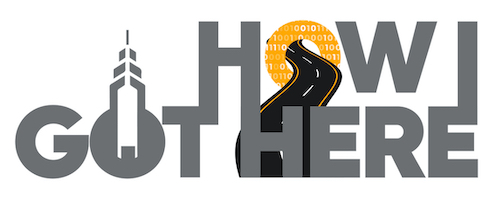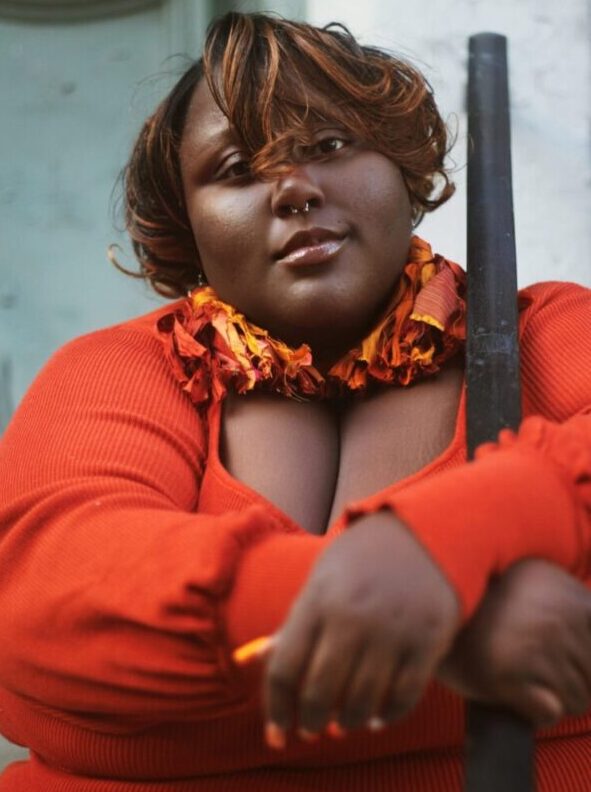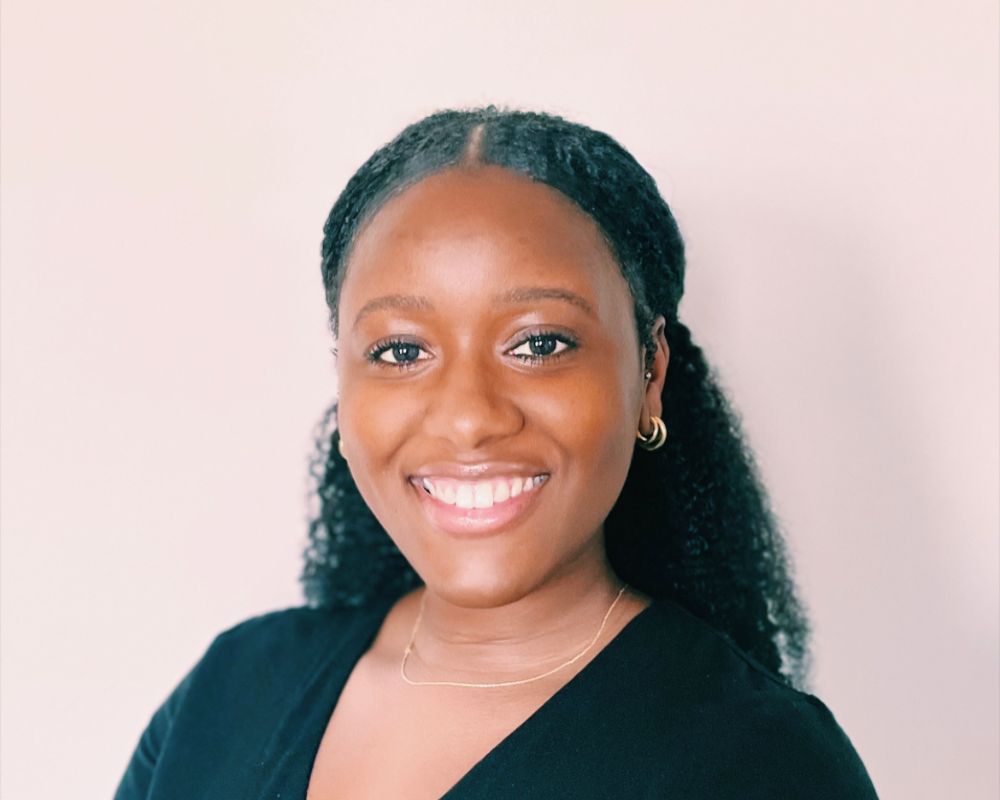Blackbird Labs, a Baltimore-based biotech accelerator aiming to assist the next generation of life sciences leaders in improving their research outcomes, announced its inaugural fellows back in November.
Brittni Moore, a Black woman and self-described foodie who is interested in translating science to medicine, was among the near-graduation Ph.D. students at Johns Hopkins School of Medicine selected for the fellowship.
A resident of Mount Vernon and a fifth-year doctoral candidate, Moore’s research at Johns Hopkins’ Pluznick Lab focuses on G protein-coupled receptors (GPCRs). She aims to understand how the gut microbiome affects the kidney at the genetic level to uncover its impact on renal function.
Moore spends most days on Hopkins’ East Baltimore School of Medicine campus near Johns Hopkins Hospital. When she’s not working on her forthcoming manuscript — a step in the closure of the research project — the senior graduate student focuses on conducting experiments at Pluznik, data analysis and supporting newer trainees in the lab.
Read Brittni’s research on the gut microbiome
Before mentorship and Moore’s fellowship with Blackbird, her journey traces back to her experience working at a retail store specializing in pharmacy, health, wellness and even photo products. You already know it as Walgreens.
Here’s a look at how she got from Broken Arrow, Oklahoma to Malibu, California, where she met “some of the best people” who piqued her interest in what she calls the “DMV.” There, she enjoys both being an independent researcher in an academic setting and a good brunch. This interview has been edited for length and clarity.
How would you describe your job to a five-year-old?
I study really cool things that help kidneys smell. I’ll leave it at that.
What was the first job you ever had?
I’m born and raised in Broken Arrow, Oklahoma. So back in Oklahoma, I was at Walgreens. I worked there throughout all [of] my high school journey. And it’s very funny because it was one of those jobs where I made such good connections. Not only did they allow me to come back and work over the summers when I would come home, but I ended up meeting one of the bigger sponsors for my undergrad while Iwas working at Walgreens in Oklahoma.
He had connections with my institution in Malibu, California [Pepperdine University]. He said he saw promise in me [and] offered to endow a scholarship in my name. So I always say: Let this be a lesson learned that you never know who you’ll meet and who can change the trajectory of your life. So be kind to everyone, be open to everyone and allow people to support you in ways that you don’t even know that you needed.
How’d you decide to move to Baltimore?
When I moved out there [California], I ended up meeting some of the best people who so happened [to be] from DC. So I then started to set my eyes on the DMV region. It seemed like a very cool place: A bustling city, ethnically diverse [and was] somewhere that I wanted to live. And so, once I graduated undergrad, I moved to DC and started my fellowship [with the National Institutes of Health]. I met some of my closest and best friends, lifelong friends, had the best time. DMV brunches are unmatched.
[Back then] I was still kind of figuring it out. I thought I wanted to be a doctor and go into medical school from the moment I was an undergrad. And it wasn’t until I went through the process, got accepted into medical school, that I decided that I actually enjoy the autonomy that a Ph.D. can afford me a little bit more. So I took one more year to apply to Ph.D. biomedical programs. And that’s how I ended up at Johns Hopkins in Baltimore.
Can you discuss the impact that mentorship fellowships, accelerators and incubators may have on the success of a Black woman navigating the intersection of health and innovation?
Oh, that’s a great question. … I’ve been doing quite a bit of different fellowships and internships since undergrad, but I think one of the most impactful transition periods of my life was when I was freshly graduated from undergrad and I moved here to Bethesda for the first time. And I was a cancer research training fellow at the National Institutes of Health and at the NCI, the National Cancer Institute. One of the best experiences of my life. Not only was I deep into the clinical research, I was an associate investigator on a Phase 1 clinical trial that looked at taking a patient’s dendritic cells and curating a vaccine against HER2-positive breast cancers.
But my direct mentor is this powerhouse of a Black woman. Her name is Dr. Lauren V. Wood. She is just one of those women that when she walks into a room, everyone is immediately captivated. She’s always showing up as the smartest person in the room, but she is just a passionate, driven individual. And so, having her as my direct supervisor transitioning into this new space of clinical trials, translational research, etc. has played a very impactful role on how I view myself in a lot of these spaces where we’re often underrepresented.
How’d you become a fellow at Blackbird Labs?
I was in my fourth year [of my Ph.D. and] still kind of figuring it out. I knew from early on that I did not want to stay in the academic setting, and that I wanted to go into what we call industry. I just didn’t know what exactly that would look like. And I started having some conversations with some great friends and now, some of my biggest role models in this field. So shout out to Aliyah Silver. … I wanted to be close to the science. I still want to be science-adjacent without being at the bench. And she kind of told me about this new startup at Blackbird and that some of the best people, most brilliant minds in biotech, [were] going to be at this company. … [Now] I have the ability to work closely with the Blackbird team to translate cutting-edge academic research into these high-potential, investable company creation opportunities. And we do this in several therapeutic areas, so immuno-oncology, neurological diseases, small molecules and biologics.

This is How I Got Here, a series where we chart the career journeys of technologists. Want to tell your story? Get in touch.
Before you go...
Please consider supporting Technical.ly to keep our independent journalism strong. Unlike most business-focused media outlets, we don’t have a paywall. Instead, we count on your personal and organizational support.
3 ways to support our work:- Contribute to the Journalism Fund. Charitable giving ensures our information remains free and accessible for residents to discover workforce programs and entrepreneurship pathways. This includes philanthropic grants and individual tax-deductible donations from readers like you.
- Use our Preferred Partners. Our directory of vetted providers offers high-quality recommendations for services our readers need, and each referral supports our journalism.
- Use our services. If you need entrepreneurs and tech leaders to buy your services, are seeking technologists to hire or want more professionals to know about your ecosystem, Technical.ly has the biggest and most engaged audience in the mid-Atlantic. We help companies tell their stories and answer big questions to meet and serve our community.
Join our growing Slack community
Join 5,000 tech professionals and entrepreneurs in our community Slack today!

The person charged in the UnitedHealthcare CEO shooting had a ton of tech connections

From rejection to innovation: How I built a tool to beat AI hiring algorithms at their own game

Where are the country’s most vibrant tech and startup communities?




